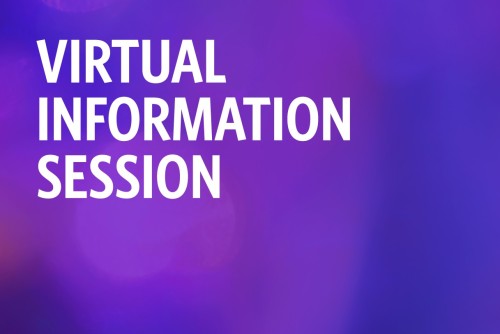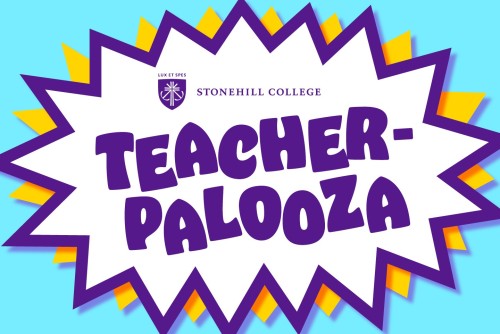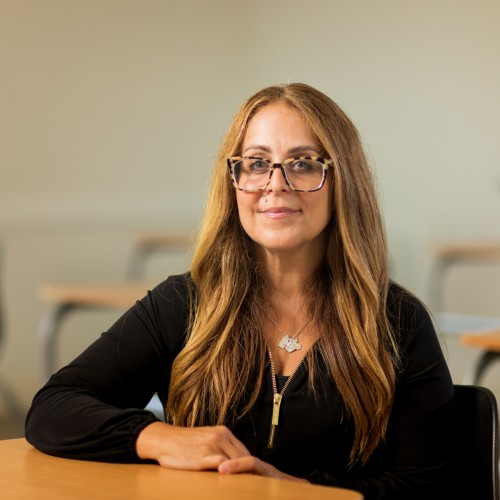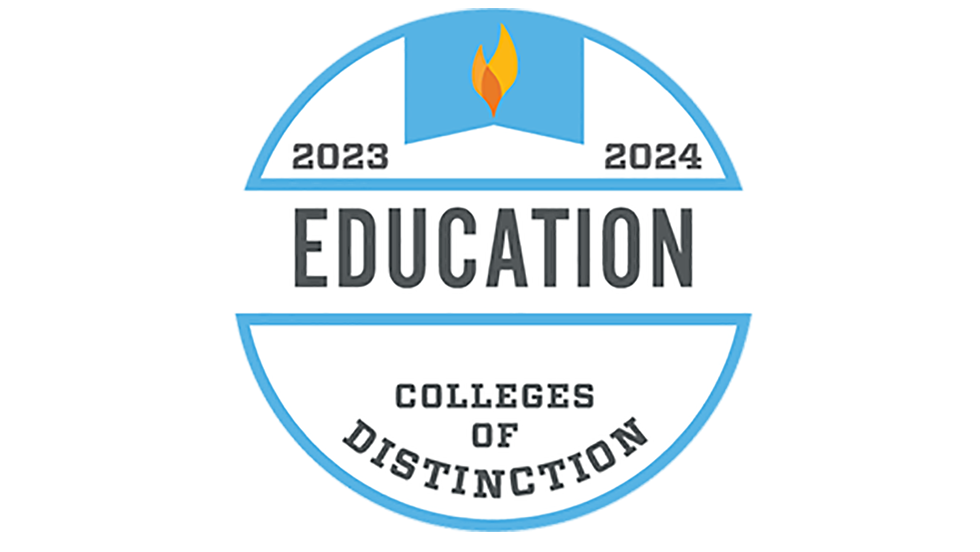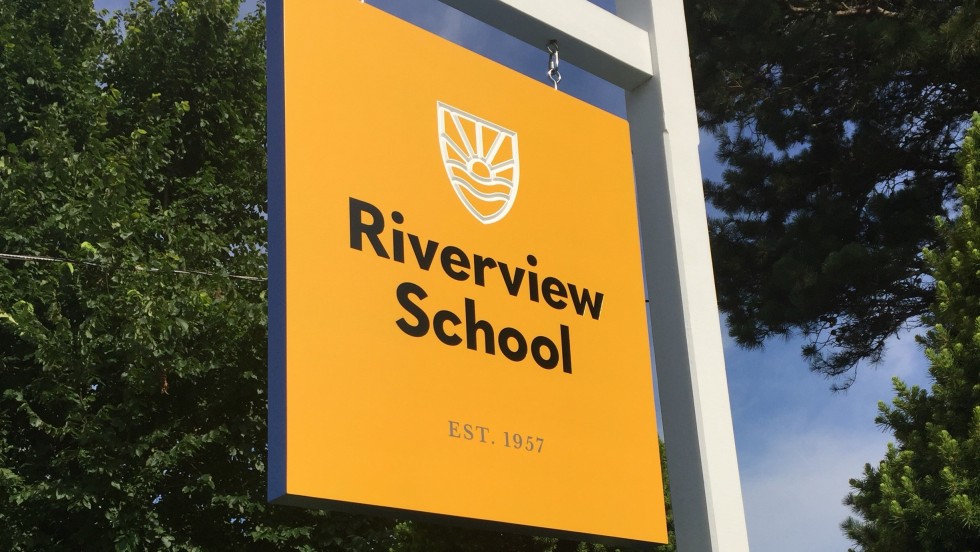Stonehill on Cape Cod: M.Ed. in Special Education
Stonehill on Cape Cod's Master of Education (M.Ed.) in Special Education is a weekend master's degree program leading to initial Massachusetts licensure in special education, PreK-8 or 5-12. It allows students to pursue their coursework at our off-campus instructional site in Sandwich, Massachusetts. Postbaccalaureate licensure options also available.
Apply by August 1, 2025.
Stonehill College's graduate teacher education programs foster the skills educators need to create and lead equitable classrooms that encompass a range of student needs and promote equity, social justice, diversity and accessibility.
Stonehill on Cape Cod benefits:
- Ideal for residents of Cape Cod and its surrounding area
- Take courses part time and complete your degree in 18 months
- Courses delivered on weekends, approximately one weekend a month
- Courses taught by Stonehill faculty with well-established expertise in their field
- Specialized student support framework guides students through program requirements and career preparation
- Free and ample parking
Teacher Licensure Options
- M.Ed. in Special Education, 5-12
- M.Ed. in Special Education, PreK-8
- Postbaccalaureate Licensure in Special Education, 5-12
- Postbaccalaureate Licensure in Special Education, PreK-8
Students may also choose to take the core courses for other graduate teacher education licenses or specializations at our location on Cape Cod.
Upcoming Graduate & Professional Studies Events
-
Virtual Information Sessions
Join us for a virtual information session or drop-in session to learn more about our master’s degree and certificate programs.
-
Teacherpalooza: A Teacher Appreciation Event
Join us Wednesday, June 17, 2026, for Teacherpalooza, a teacher appreciation event hosted by Stonehill Graduate Teacher Education to thank educators for their hard work.
Schools today must strive to be inclusive environments, and educators in our program are prepared to be leaders in creating equitable spaces where difference is valued.
Program Structure
Students pursuing a master's degree leading to initial licensure in special education, PreK-8 or 5-12, can leverage the College's partnership with Riverview School in Sandwich, Massachusetts, and complete their degree coursework on weekends at our off-campus instructional site, Stonehill on Cape Cod.
Courses for Stonehill on Cape Cod's graduate teacher education programs are delivered on weekends, approximately one weekend a month, during the fall and spring semesters and two summer terms. Each course meets in person over two weekends at Riverview's location in Sandwich.
All licensure students are also required to complete a yearlong graduate practicum in a Massachusetts public or approved private special education school. This full-time field experience can often be completed in a student’s place of employment. It is an opportunity for students to observe, assist and teach in an educational setting.
Stonehill on Cape Cod Schedule for 2025-2027
| Course | Dates |
|---|---|
| EDU 609 | September 13, 14 October 4, 5 |
| EDU 610 | November 1, 2 December 13, 14 |
| EDU 630 | January 24, 25 February 21, 22 |
| EDU 611 | March 28, 29 May 2, 3 |
| EDU 510 | Online Thursdays, 4:30–8 p.m. |
| EDU 631 | May 9, 10 June 20, 21 |
| EDU 612 | July 11, 12 August 1, 2 |
| EDU 640 | Online Thursdays, 4:30–7 p.m. |
| EDU 620 or 622 | August 29, 30 September 26, 27 |
| EDU 621 or 623 | October 31 November 1 December 5, 6 |
| Practicum | Spring 2027 In-field Supervision |
| EDU 641 |
January 30 |
Curriculum Keeps Inclusivity at the Center
Stonehill's graduate teacher education programs include unique and effective courses, programs and opportunities that foster innovation, transformation and leadership. Our curriculum keeps inclusivity central to how we prepare educators for schools, classrooms and community settings.
This 30-36-credit program leads to Massachusetts initial licensure in special education, PreK-8 or 5-12. Postbaccalaureate licensure options also available.
This course covers current policy and practice related to English Learners (ELs) in schools with a special focus on Sheltered English Immersion (SEI) Settings. Topics will include diversity issues, content/academic vocabulary development and literacy skills (including listening, speaking, reading and writing) to provide teachers with the knowledge and strategies to support ELs in classrooms.
*May be waived with documented, state-approved sheltered English immersion (SEI) endorsement.
This course introduces students to the reality of schools as diverse spaces encompassing a range of student needs and examines efforts to ensure equity in education. Issues of race, class, culture, language, gender, gender identity and expression, sexual orientation, and ability will be discussed & examined, especially how they intersect to reproduce inequality. Students will reflect on individual beliefs in relation to social justice education and democratic education and examine unintended consequences of policy/practice that create or perpetuate inequitable environments and opportunities in schools. Strategies for promoting educational equity and inclusivity will be discussed.
This course examines and unpacks contemporary issues in the field of education and provides prospective teachers with a beginning foundation for understanding the teaching profession and the U.S. education system, including policy and governance. The historical, legal, ethical, and pedagogical foundations for social justice education and democratic education will be explored, as well as the education reform context and emerging policies. The course will include an examination of professional ethics and standards.
This graduate course focuses on the Individual Education Program (IEP) and the role of the special educator in the process, from pre-referral to eligibility determination and placement, as well as implementation. Federal and state laws related to special education will be explored. Collaboration, communication, building trust, and relationships with families and school/community colleagues will be an emphasis of the course.
This course explores supportive, preventative, and proactive approaches to addressing the social and academic behaviors of students with disabilities and other diverse populations. Strategies for developing a positive classroom climate to support social and emotional development, including trauma and anxiety, will be central to the learning of the course. A variety of approaches, including the connection between communication & behavior, identifying contributing factors to challenging behavior, functional behavioral assessment (FBA), and behavior support plans, will be explored.
This course explores literacy for young learners and provides participants with information on how to effectively teach literacy to all students. Course participants will learn how to design literacy lessons, utilizing universal design for learning and assessment practices, to create thriving readers and writers. Through this course, participants will learn about how to design and implement lessons focused on phonemic awareness, comprehension, oral reading fluency, and vocabulary. Additionally, course participants will learn pedagogical strategies for supporting young writers. Strategies to assess students’ literacy growth will also be addressed.
This course examines methods of teaching mathematics to diverse learners and contemporary methods of math assessment to ensure all students succeed mathematically. Course participants will develop instructional routines and apply standards in the design of curricula to improve how math can be humanized in classrooms. The course explores issues related to technology, math pedagogy, and math equity.
This course explores language and literacy instruction for middle/high school students with disabilities. The course will emphasize how to design literacy lessons for diverse adolescent learners, including how to assess students’ literacy progress. Course participants will learn about the specific aspects of reading and explore how to support students’ needs in all areas. The course will provide participants with assessment strategies in literacy. Participants will also learn specific strategies to support students writing skills throughout all content areas.
This course examines the pedagogy of math instruction for middle and high school aged diverse students. The course will explore instructional strategies and routines to support all learners to develop mathematical thinking. Participants will develop instructional routines and apply standards in the design of curricula to improve how math can be humanized in classrooms. The course explores issues related to technology, math pedagogy, and math equity.
This three-credit course addresses issues in the assessment of children and youth with disabilities, and reviews norm-referenced and criterion-referenced assessments, developmental scales, and formal and informal observation techniques. Students will acquire an understanding of the issues related to selecting and administering a variety of assessment tools, and to interpreting, communicating and utilizing data from assessments to support the education of students with disabilities.
This course explores how curriculum built on the goal of student understanding, integrated with instructional approaches that emphasize reaching every learner, can provide teachers with more specific teaching targets and more flexible ways to reach them. Students will examine the teaching, instruction, and curricula required to meet the needs of diverse learners, who by virtue of their experiential, cultural, and socioeconomic backgrounds, challenge traditional curriculum and instructional programs.
Course participants will determine how to deconstruct curricular barriers and create and apply curricular solutions, including assistive technology and AAC, to maximize access and academic success.
During this hybrid clinical and class-based graduate experience, which commences the practicum, students focus on the design and implementation of standards-based (both state and social justice standards) lessons that are designed using the principles of Universal Design for Learning. Graduate students receive coaching and targeted and actionable feedback on lesson design and implementation from both instructor and class colleagues.
This course is taken concurrently with a graduate practicum or internship. This capstone seminar will focus on social justice education, professional culture, family & community engagement, collaboration, and curriculum and planning for educational contexts. Students will reflect on experiences in the practica/internship site and current issues and best practice in education, including trauma and social emotional learning.
Field experience requirement.
Studying Education at Stonehill
Stonehill College's graduate teacher education programs prepare educators to lead inclusive learning environments. The College offers master's degree, teacher licensure, community education and graduate certificate program options.
Graduate Teacher Education at Stonehill
Stonehill College's graduate teacher education programs aim to prepare knowledgeable, reflective, caring and flexible educators who embrace learning, scholarship, community and advocacy in their work. Social justice and democratic education are at the center of our work and underpins all programs, courses and experiences. We believe education can disrupt systems and processes that perpetuate injustice and inequity and embrace diversity and individuality as strengths.
We advance our mission by modeling the creation of democratic spaces in the graduate classroom that reflect equitable, accessible and inclusive learning environments where students' voices and perspectives help to shape the construction and the provision of their learning.
Three tenets guide our program philosophy:
- Social justice education
- Democratic education
- Anti-oppressive education
Graduate Teacher Education Program Outcomes
Our graduates
- Foster care, connection and community with students, colleagues and families
- Promote inclusivity, diversity and equity in educational spaces
- Work to disrupt systems that perpetuate oppression and inequity
- Embrace teaching practices that foster social justice and democracy
- Lead by making education accessible for all learners
- Elevate student voices and perspectives in education
- Act purposefully to continue to learn and contribute to the profession
Rigorous Academics and the Support to Succeed
Stonehill’s graduate teacher education programs recognize the challenges graduate students face in prioritizing work, family, personal and graduate school commitments. Our Graduate Student Support, Access and Success (SSAS) Framework is designed to support students’ success from program start to finish.
Specifically, this approach provides:
- A proactive vs. reactive framework for supporting graduate students’ variable needs within their program
- Clear benchmarks for assessment of candidate readiness
From the admission process to graduation, students have a clear understanding of both expectations and the support available to help them achieve their goals.
About Riverview School
Contact Information
Graduate & Professional Studies Admission assists students as they explore graduate and professional opportunities offered at Stonehill College.
